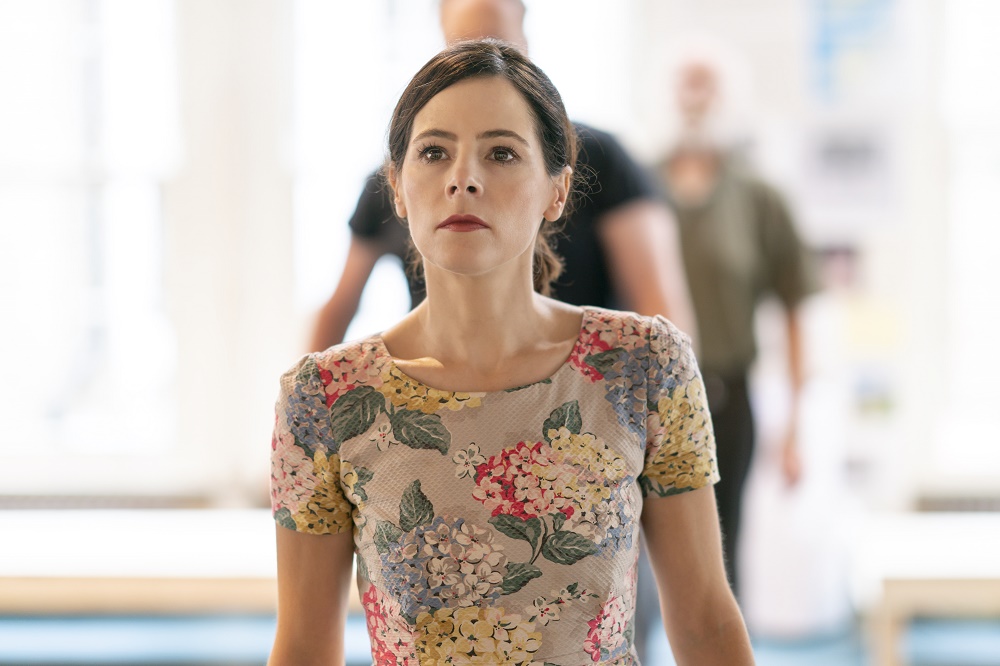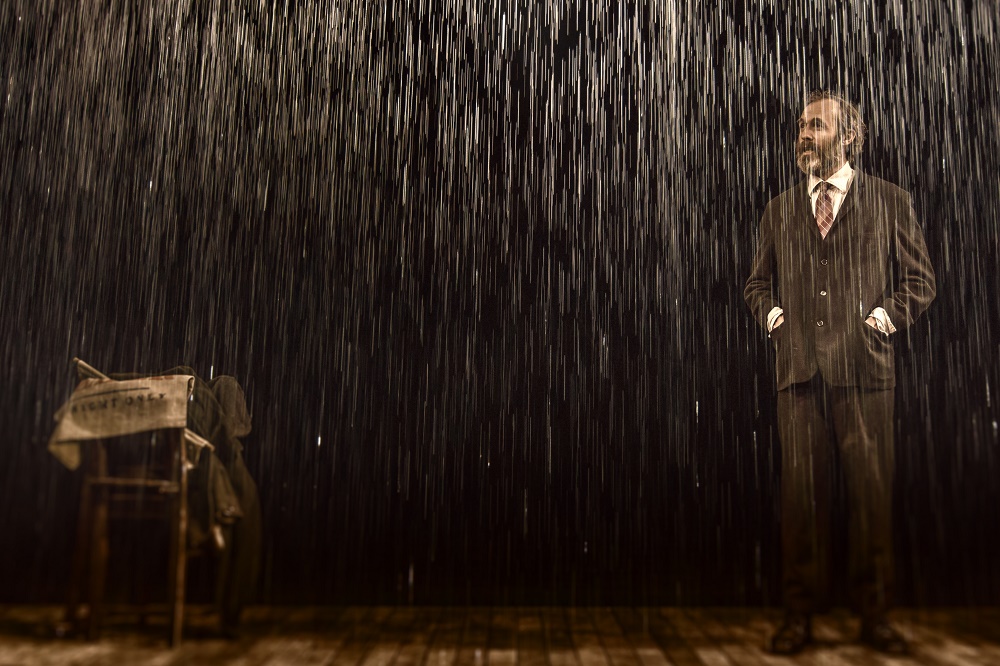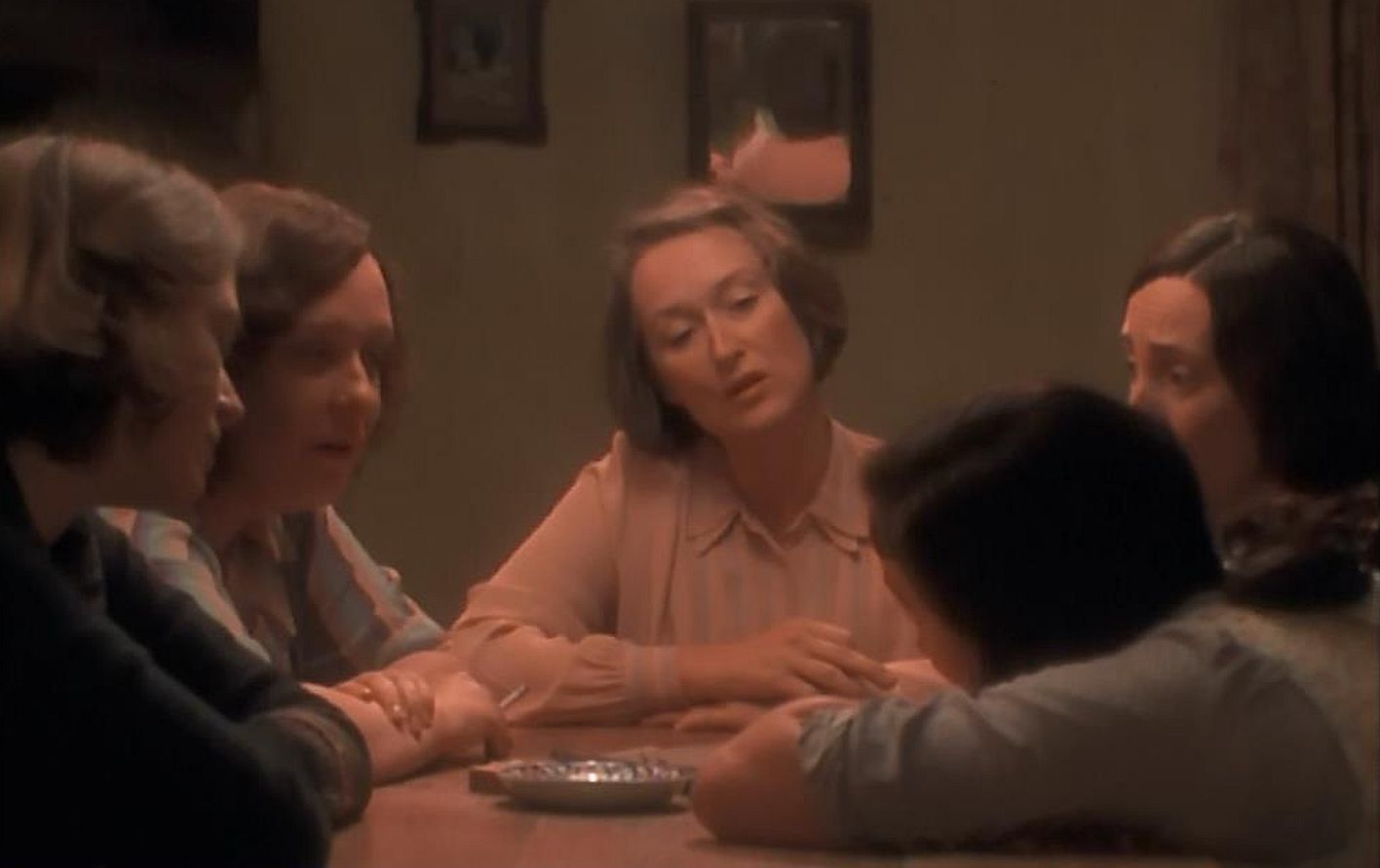Brian Friel, who died in 2015 at the age of 86, was a shy man who shunned interviews, keeping his powder dry for the work and shrouding his personal life in mystique. Not that he never opened his mouth at all. When Dancing at Lughnasa (1990) was winning Tony Awards in New York, he got into trouble for saying that a good stage manager is preferable to a director who disobeys the script. One or two American directors may have smirked when in 1993 Wonderful Tennessee closed on Broadway after nine performances. A year later Molly Sweeney won more awards in New York - a pleasing affirmation for Friel, whose directorial debut this was.
Mostly he let his plays do the talking, and this summer they are talking as loudly as ever. An acclaimed revival of Translations at the National Theatre is to be joined by his 1979 play Aristocrats at the Donmar Warehouse, starring Elaine Cassidy (pictured below in rehearsal by Johann Persson). Set on the occasion of a wedding, it tells of a grand family in a Chekhovian state of irreparable decline. It will be directed by Lyndsey Turner, who is the Donmar's go-to Friel specialist: previously at the theatre she has directed his plays Faith Healer and Philadelphia, Here I Come! and his stage adaptation of Turgenev's Fathers and Sons. For years Friel was the undisputed heavyweight champion of Irish theatre, while young pretenders like Conor McPherson, Martin McDonagh and Gary Mitchell reaped the rewards of a surge in Irish theatre which Friel did more than most to sow. He was born near Omagh in County Tyrone in 1929 and, confusingly, there were two birth certificates to prove it: one for January 9, another for January 10. He was brought up in a family of staunch nationalists in Derry/Londonderry, the city with two names, but childhood holidays were spent across the border in Donegal. His father was an academic, and for a while Friel was also a teacher. By the precocious age of 21 he was also a contract writer for The New Yorker, a perennial patron of Irish letters.
For years Friel was the undisputed heavyweight champion of Irish theatre, while young pretenders like Conor McPherson, Martin McDonagh and Gary Mitchell reaped the rewards of a surge in Irish theatre which Friel did more than most to sow. He was born near Omagh in County Tyrone in 1929 and, confusingly, there were two birth certificates to prove it: one for January 9, another for January 10. He was brought up in a family of staunch nationalists in Derry/Londonderry, the city with two names, but childhood holidays were spent across the border in Donegal. His father was an academic, and for a while Friel was also a teacher. By the precocious age of 21 he was also a contract writer for The New Yorker, a perennial patron of Irish letters.
I feel I don't ever want to write about politics
Friel switched to plays in the late 1950s, but it was on the strength of one of his New Yorker short stories that the director Tyrone Guthrie invited him to Minneapolis to hone his craft. Although Friel's early plays dwell on the theme of Irish exile - signally Philadelphia, Here I Come! (1964), set on the eve of Gar O'Donnell's departure for America - these six months were his only appreciable stint away from the north-west corner of Ireland. Gar rails against "all this sentimental rubbish about `homeland' and `birthplace' - yap! Bloody yap! Impermanence - anonymity - that's what I'm looking for; a vast restless place that doesn't give a damn about the past." We can take it that Friel did not agree. The plays, like the playwright, also tended to stay put. They are largely set in Ballybeg, a kind of fictional heimat which Friel likened to William Faulkner's Yoknaptawpha County. Indeed his 1997 play Give Me Your Answer, Do! told of a writer pushing on in years who lives in the rural isolation of Donegal.
In 1968, with the troubles in Ulster about to escalate into the Troubles, Friel decamped across the border to Donegal. "I would much prefer to be under the jurisdiction of the Dublin government," he said at the time. The work at this juncture became more overtly political, at some financial cost. At a time when the republican terrorism was at its most intense, reviewers outside Ireland saw an implicit defence of the IRA in The Freedom of the City (1973) and Volunteers (1975), which attacked the heavy hand of British authority in Ulster.
"I feel I don't ever want to write about politics," he told the New York Times in a rare breach of the media blackout, "but sometimes it happens. It's not a deliberate policy to get involved in political drama. In fact, I'm far from sure of the wisdom or the validity of it.... I want to be more private and I want isolation, but there's a seduction of political drama, of political art. These last 20 years have been stressful and oppressive." Like Yeats, he was offered the chance to have an official say in public affairs when Charles Haughey appointed him an independent member of Senate for two years from 1987. Like Yeats, he declined to attend. (Pictured below: Stephen Dillane in Faith Healer, photograph by Johan Persson) Politically, Friel preferred to go in at ground level. In 1980 he founded Field Day, a roving theatre company and supporter of pan-Irish culture, with a distinguished board including Stephen Rea, Seamus Heaney, Tom Paulin and Seamus Deane. Jointly financed by the arts councils of Dublin and Belfast, it annually toured village halls north and south, and allowed Friel to premiere his plays in the most democratic manner possible. Translations, his masterpiece about the British project to map Ireland and de-Gaelicise its place names, was the inaugural production. Frank Rich, the infamous play-slayer of the New York Times, wrote that "Mr Friel makes the Irish condition synonymous with the human one." Translations could be about the imposition of any dominant culture on a vulnerable one.
Politically, Friel preferred to go in at ground level. In 1980 he founded Field Day, a roving theatre company and supporter of pan-Irish culture, with a distinguished board including Stephen Rea, Seamus Heaney, Tom Paulin and Seamus Deane. Jointly financed by the arts councils of Dublin and Belfast, it annually toured village halls north and south, and allowed Friel to premiere his plays in the most democratic manner possible. Translations, his masterpiece about the British project to map Ireland and de-Gaelicise its place names, was the inaugural production. Frank Rich, the infamous play-slayer of the New York Times, wrote that "Mr Friel makes the Irish condition synonymous with the human one." Translations could be about the imposition of any dominant culture on a vulnerable one.
Another masterpiece was Faith Healer (1979), which supplied three Rolls Royce roles – for two actors and an actress – and in a series of four monologues told of the journeys round the fringes of Britain of a tawdry charismatic shaman and his tragic entourage. More than any of Friel’s plays it showcased his irreducible mastery of the theatrical form, of the primordial power of words in performance to cast a spell. Like responsible Northern Irish Catholics, the Friels had five children. Dancing at Lughnasa, his most Chekhovian experiment in mournful plotlessness, may as well be called Five Sisters. The play loosened his decade-long involvement in Field Day. Noel Pearson had asked if he could mount a new Friel at the Abbey, and a two-acter about a doomed quintet of Donegal spinsters at the dawn of the wireless age duly arrived. "I told him it was going to go all over the world," recalls Pearson, "And he told me I was mad."
Like responsible Northern Irish Catholics, the Friels had five children. Dancing at Lughnasa, his most Chekhovian experiment in mournful plotlessness, may as well be called Five Sisters. The play loosened his decade-long involvement in Field Day. Noel Pearson had asked if he could mount a new Friel at the Abbey, and a two-acter about a doomed quintet of Donegal spinsters at the dawn of the wireless age duly arrived. "I told him it was going to go all over the world," recalls Pearson, "And he told me I was mad."
It took Friel four years to bow to Pearson's badgering about turning it into a film (starring Meryl Streep, pictured above). "He felt that cinema is not really a writers' medium. As Lughnasa was such an important play for him he didn't want the risk of it not working as a movie. Eventually he said, `Well I'll give you 100 out of 10 for persistence. If you really want to do it that badly, go ahead and do it.'" He may not have spoken to newspapers, but in other areas he was willing to put an end to his own intransigence.














Add comment